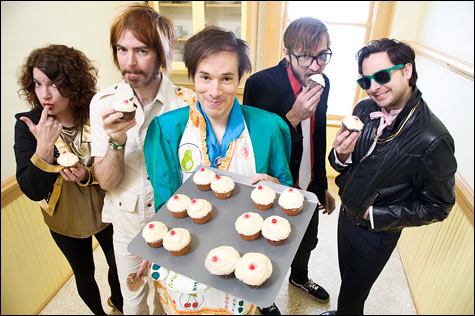
IDENTITY CRISIS "To drummer/multi-instrumentalist Jamey Huggins (right), Of Montreal "feels like it's been five or six different bands." |
At this point, it's a cliché to unpack the mash-up as a symbol of our smashed-apart-and-haphazardly-reassembled musical landscape. It used to be good for a laugh when some kid with a computer dovetailed Destiny's Child with Screaming Trees, but pop royalty and obscurist indie pop seem to be commingling on a far more regular basis these days. When Beyoncé, in a recent Guardian interview, pegged Georgia art weirdos Of Montreal as a group with whom she'd love to collaborate, the real weirdness was in how sensible it all seemed — as pop music has gotten skronkier and more fuzzed-out, indie rock has slowly molted its hatred of the mainstream and started to display the very flamboyance and hook worship it once held as anathema.
The tale of how Of Montreal — who come to the Paradise this Wednesday — got Ms. Knowles's attention (through her sis, Solange, who will play a prominent role on an upcoming long-player to be titled either False Priest or The Controller Sphere) is but a minor episode in the greater saga that makes up their lengthy history. Formed in 1996 by lead freak Kevin Barnes, the band became one of the later members of the psychedelic collective of Athens groups known as the Elephant 6 collective. The E6 ethos comprised a loose and shaggy allegiance to fractured song structures, overarching melodic convergence, and frenzied waving of the freak flag, as initially displayed in early collective three-word-name bands like Olivia Tremor Control and Neutral Milk Hotel.
To OM drummer/multi-instrumentalist Jamey Huggins, "it feels like it's been five or six different bands." He describes a transformation — "from a sort of vaudevillian approach to performance to an overtly sexual kind of over-the-top visual experience" — that has a lot to do with Of Montreal's drastically altered dynamic, as the project has morphed from a loose collective of musicians to what's in essence a one-man show. "We've gone from being very inclusive, with lots of extra people playing percussion and what-not, to now, where all of the songwriters have drifted to their own little pods, and it's very solitary."
Of Montreal is Barnes's pod, with each album emerging as more idiosyncratic than the last. The biggest change came with the 2007 breakthrough, Hissing Fauna, Are You the Destroyer? (Polyvinyl), a dense shuffle of anthemic grandeur (like the opening "Suffer for Fashion") with inscrutable weirdness (like the epic wallow of "The Past Is a Grotesque Animal"). Last year's Skeletal Lamping outdid its predecessor in unpredictability, all under the guise of immaculate pop, making it clear that the stylistic shifts and jarring mood changes were here to stay.
For his part, Huggins is as excited about the new direction as he is wistful for the old collectivism. "I'm nostalgic and sentimental about that period, totally. I think a lot of people think, 'Oh, that's back when we were in college, before we moved on to the real world.' But I often go back and listen to those records." Huggins himself betrays his love of both '90s lo-fi indie-isms and '60s psychedelia in his performance as James Husband (under which name he'll join Of Montreal on the Paradise bill) on his solo debut, A Parallax I (Polyvinyl) — a finely detailed love letter to both eras that highlights his ear for a great tune, without the schizo urges of his day-job band.